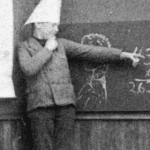I feel just the opposite about this text. I hope somebody does read it at my funeral. Most of us think that this poem at the end of the Book of Proverbs is talking about the perfect human mother and homemaker. The total woman. Or as one smart aleck put it, "the totaled woman!"
But recent studies of the text reveal that it's not talking about a human woman at all, but another woman entirely. She is someone who has made several cameo appearances before in the Book of Proverbs. She shows up in chapter 1 standing in the marketplace, calling the young and foolish onto the path of God's wisdom. She shows up in chapter 8, again calling the foolish to seek God's wisdom, and describing her role as a joyful helper with God in the Creation of flora, fauna, Fred and Wilma. She shows up in chapter 9; here she builds the household of Wisdom, and stands before her seven-pillared home inviting passersby to come and feast at her table. This is no maniacal, multitasking human mom, my friends. This is the wisdom of God, imaged in Proverbs as a Wise Woman, a prophetess.
And throughout the thirty chapters that lead up to this final poem, Wisdom is shown as inviting us into her household where she provides us with all the things mentioned in the final chapter: food, clothing, light, wisdom, shelter. All metaphors for Divine nourishment and nurture. Doesn't she remind you of someone? Someone who said, "I am the Bread of Life. I am the Living Water. I am the light of the world. I am the Way the truth and the life?"
M is not for the million things you have to do today or should have done yesterday or better do tomorrow to be the perfect hallmark mom. M is for the many things God's Wisdom provides for us in the difficult roles each of us fills in life.
The Wise Woman, in Proverbs 31 is a nice counterpart to God the Good Shepherd of Psalm 23. Both portray a God who nourishes and protects us when we are vulnerable, weak, and imperfect.
M is for the Many People Christ Invites into His Kingdom
As Christians our invitation to enter the household of God's Wisdom to be fed, taught, sheltered and clothed becomes an invitation to enter the embrace of Christ. "Let the little children come to me; do not hinder them. For to such as these belongs the kingdom of God. Truly I tell you, whoever does not receive the kingdom of God as a little child will never enter it" (Lk. 18:16b, 17).
People were bringing children to Jesus. Such an increasingly popular teacher should not be seen stooping to the level of children. Jesus overrides his disciples' objections and invites children to come to him. How typical of Jesus! No one more than Luke emphasizes how his whole ministry was addressed to those who, like children, were not valued in his day, because his society scorned smallness, weakness, poverty, helplessness, and vulnerability. Jesus invited those who were filled with shame because they were not fulfilling the roles society expected of them. They did not measure up. They were outcasts in their own minds and, often, those of others. Lepers, the women with the hemorrhage, the woman at the well who had been married several times, the woman caught in adultery.
Jesus overrides all objections (even yours) and issues an invitation to you and me just as surely as to those children hundreds of years ago.
Let those who are not fulfilling everybody's expectations for your role in life, come to me. You who have regrets about your past relationships, come to me.
You who have serious doubts about whether you can handle what lies ahead of you, come to me.
You who seethe with resentment toward your parents come to me.
You who are lonely on a family day, come to me.
You who are overburdened, doing the work of at least two people, come to me.
You who feel trapped in an unhealthy relationship, come to me.
You who have thoughts no "good mother" would have, come to me.
You who are in the grip of addictions that damage your relationships—from substances to emotions to habits—come to me.
Let those who know they can no longer do this alone, come to me.
The kingdom of heaven begins for you right now in the arms of your Lord.
What do you see in this picture? A human mother, perhaps sleeping. We can assume, since she is human, that she is not a perfect mother, that the face we can't see sometimes wears a frown of irritation, that the eyes beneath the hat are not always shining with love light. We can imagine that those hands, so peaceful here, are more often busy changing diapers and washing clothes, and preparing food for her child.
But caught in this peaceful moment we sense something else in this picture. A caring presence, whose face we cannot see, but whose love is evident in the embrace with which she holds her child. A child resting in a state of complete trust. The shadow of the parent's hat extends to surround the child: a radiant radius of love.
When I came across the picture shown above in our family photo album, I thought it was a good one for Mother's Day. My brother Wade snapped it while daughter Rebecca, now grown, was sleeping peacefully with me (a far from perfect human mom) at the beach years ago. I thought it was a good picture for Mother's Day. For it is a day when, as the Christian Church, we celebrate not the many things life demands of us, but the manifold provision of God who enfolds us in the divine embrace and invites us into the kingdom that is not yet, but already, whenever we respond to God's invitation.





